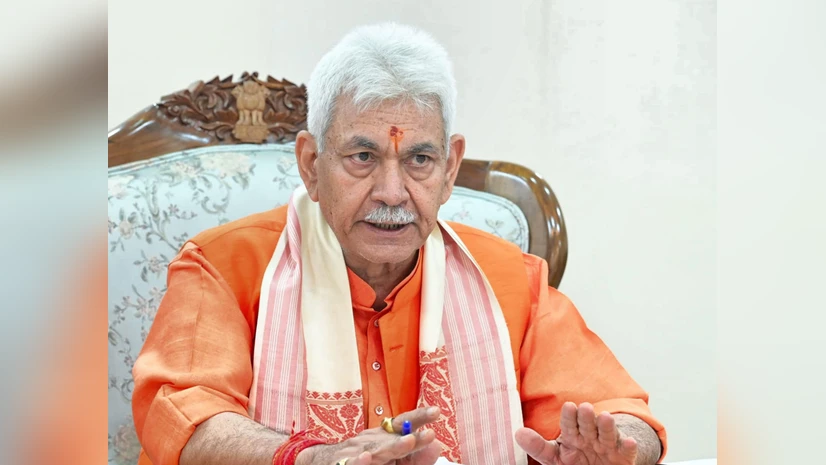In a detailed preliminary affidavit filed before the Jammu & Kashmir High Court, the Union Ministry of Home Affairs (MHA) has asserted that the Lieutenant Governor (LG) of the Union Territory of Jammu & Kashmir possesses the statutory authority to nominate members to the J&K Legislative Assembly at his discretion, without requiring the aid and advice of the Council of Ministers.
The affidavit underscores that this power falls outside the realm of the elected government’s business. Citing several rulings of the Supreme Court, the MHA emphasized that the provisions of the Jammu & Kashmir Reorganization Act should be interpreted in line with the laws governing other Union Territories.
Specifically, the Ministry pointed out that the nomination powers vested in the LG of J&K are analogous to those in Puducherry and Delhi—both Union Territories with Legislative Assemblies. The MHA’s submission seeks to clarify the statutory nature of the LG’s powers amid ongoing legal debates over the governance framework of the Union Territory.
In a detailed affidavit filed before the Jammu & Kashmir High Court, the Union Ministry of Home Affairs (MHA) has asserted that the Lieutenant Governor (LG) of Jammu & Kashmir holds the statutory authority to nominate members to the J&K Legislative Assembly at his discretion, without requiring the aid and advice of the Council of Ministers. This comes in response to a Public Interest Litigation (PIL) challenging the constitutional validity of Sections 15, 15A, and 15B of the Jammu & Kashmir Reorganization Act, 2019.
Background of the PIL and Legal Question
The PIL, filed by Ravinder Kumar Sharma, Senior Vice-President and Chief Spokesperson of the Jammu & Kashmir Pradesh Congress Committee (JKPCC), questions whether the provisions allowing nomination of members to the Assembly — which can potentially alter the government majority — violate the basic structure of the Constitution.
The High Court framed the question on October 21, 2024, seeking clarity on whether these sections are ultra vires the Constitution.
Statutory Powers of the Lieutenant Governor
The affidavit clarifies that the Reorganization Act governs the legislative and administrative framework of Jammu & Kashmir, a Union Territory with a 114-member Legislative Assembly. Of these, 24 seats remain vacant, reserved for areas in Pakistan-occupied Jammu Kashmir (PoJK).
The LG holds executive authority similar to that of the administrators of other Union Territories like Delhi and Puducherry. Under Section 32 of the Act, the LG has discretionary powers over Police and Public Order.
The affidavit highlights the Jammu & Kashmir Reorganization (Amendment) Act, 2023, which increased the Assembly strength from 107 to 114 members and introduced Sections 15A and 15B. These sections empower the LG to nominate two members from the Kashmiri migrant community — including one woman — and one member displaced from PoJK, ensuring their representation.
Ensuring Inclusivity and Representation
The MHA underscored that the enactment of these sections was necessary to guarantee inclusivity and representation for communities historically displaced or underrepresented in the Assembly. Section 15 allows nomination of members to ensure adequate representation of women if the LG believes they are inadequately represented.
Such provisions are aligned with those in other Union Territories with Legislatures, maintaining constitutional principles of inclusivity, justice, and democratic representation.
Constitutional and Legal Precedents
The affidavit further asserts that Jammu & Kashmir remains a Union Territory governed by Article 239 of the Indian Constitution, with executive power vested in the President and administered through the LG.
The MHA cited Supreme Court rulings related to Delhi and Puducherry, where it was held that the LG exercises nomination powers as a statutory duty, not as part of the executive government. Hence, the LG’s discretion does not require the advice of the Council of Ministers.
The affidavit dismisses attempts to distinguish Jammu & Kashmir from Puducherry, emphasizing both UTs’ legislative bodies’ composition and powers are prescribed by Parliament.
Legislative Assembly Strength and Nomination Powers
Addressing the petitioner’s concerns regarding the Assembly’s sanctioned strength, the MHA clarified that the 2023 amendment legally increased the Assembly’s size to accommodate nominated members, ensuring the nominations are neither arbitrary nor unconstitutional.
The sanctioned strength includes 114 elected members plus those nominated under Sections 15, 15A, and 15B.
On the Maintainability of the PIL
Finally, the MHA questioned the maintainability of the PIL, suggesting it is politically motivated and an attempt to disturb the democratic process in Jammu & Kashmir. Citing Supreme Court precedents, the Ministry stated that PILs should be reserved for genuine public interest matters, not political ambitions.
The MHA urged the High Court to dismiss the petition at the threshold. (Agencies)









